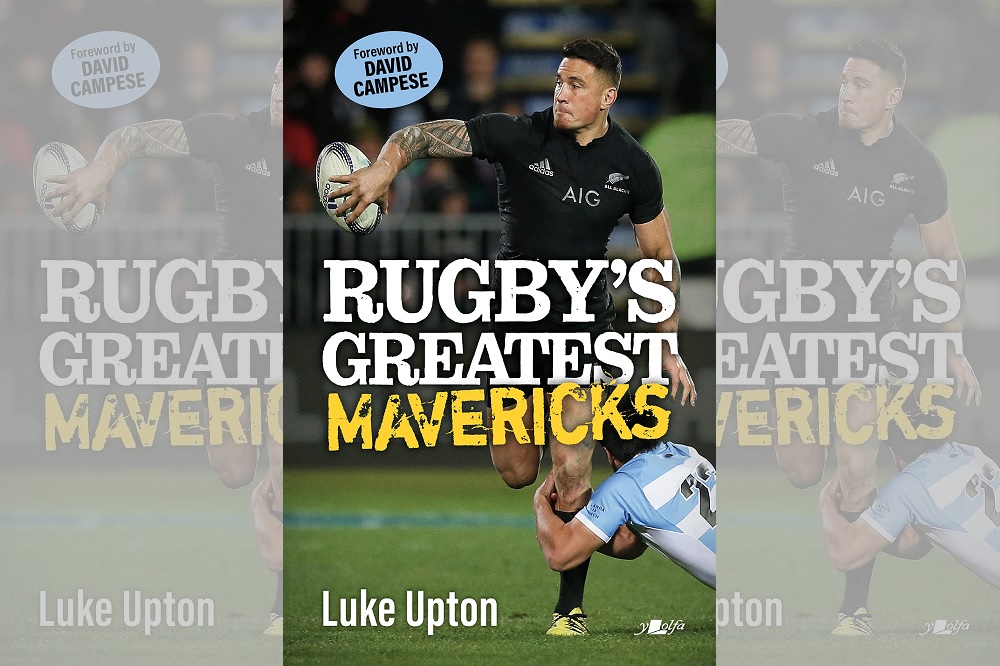Review: Rugby’s Greatest Mavericks by Luke Upton

Rhodri Davies
2022 is seemingly the year of the ‘Maverick’. With Tom Cruise having reprised his most famous role for a Top Gun sequel, we now have Luke Upton celebrating a whole host of equivalents – all intent on living life in ‘The Danger Zone’ – with Rugby’s Greatest Mavericks.
Dictionary definitions of the word invariably contain explanations such as ‘unorthodox’ and ‘independent minded’, but after tracing its origins back to an unlikely source – Texan cattleman Samuel Maverick – Upton provides his own interpretation of the term’s meaning with regard to his rugby choices.
His twenty mavericks have this in common: “An independence of spirit, a desire to do things their own way and a belief in their own path – which whilst not always correct, is typically memorable, occasionally disastrous but always true to them…They are the ones who made us want to play the game when we were kids.”
Mercurial
To a certain generation, this description conjures up images of one player in particular, the mercurial, majestic and at times – for his own team-mates in particular – infuriating David Campese.
Upton has chosen well in bringing the Aussie legend onboard, and Campo’s foreword contains everything you would expect: a touch of arrogance, a scatter-gun approach and plenty of common sense and wisdom with regard to the game’s direction of travel.
“There’s not nearly enough flair on the pitch…There are a lot of great players out there, but I worry that if the crowd aren’t entertained, those crowds will drift away,” writes Campese, whilst making very interesting points about academies: “the worst invention in rugby”, over-coaching, lack of on-field thinking and the modern game’s negativity.
One can only imagine Campo’s views on Warren Gatland’s return to Wales for a second stint as coach, despite the New Zealander’s three Grand Slams.
As it happens, Gatland’s approach is referenced in relation to another of the book’s stellar cast of characters – Finn Russell – who experienced a frustrating time on the 2021 Lions tour to South Africa.
Russell is among a host of interesting choices and often their relationships with team-mates and coaches form the most intriguing part of their narrative. Russell, for example, is regularly at odds with Scotland coach Gregor Townsend too.
Townsend was himself a true maverick as a player, but one whose instincts as a coach tend towards the more dependable and less unpredictable.
There are often elements of cavalier and round-head at play here – the endless debates around David Bishop and Robert Jones in 1980s Wales for example.
There are other common maverick traits on show too, with complicated back-stories and multi-faceted characters such as Sonny Bill Williams, Ray Gravell and James Small among the list of stars.
Complicated often begets controversial, exemplified by Keith Murdoch’s expulsion from New Zealand’s tour of Wales in 1972 and Danny Cipriani’s whole career.
Personalities
But the Cipriani story – the book’s opening chapter – is a good barometer for what follows. There is depth to the players themselves, to their personalities, to their numerous tragedies – and there is depth to Upton’s treatment of his chosen twenty.
You feel their pain and understand their natures. Failings are not excused, but put into context.
As Non Evans – another true rugby great – honestly admits when asked to define a maverick’s make-up: “I think deep down a lot are a little insecure. They need to prove something. To someone or themselves.”
Which leads us back to the ultimate ‘Maverick’. American comedian Rich Hall has noted that each Tom Cruise movie character must overcome a crisis of confidence before winning the day. Whether he’s a jet-pilot, a racing car-driver, a sports agent or a secret agent, that sense of insecurity, vulnerability…the odd howler even…come with the territory.
Think of Campese versus the ‘89 Lions, that series defining loose pass, the revulsion among his own countrymen that followed. For Australians, that was worse than being responsible for the death of ‘Goose’. Like Cruise in all his films though, Campo recovered, to be the stand-out player of the Wallabies’ 1991 World Cup winning side.
Highlights
So Rugby’s Greatest Mavericks is a broad church, as evidenced by three individualistic flankers, Ireland’s campaigning clergyman, Marnie Cunningham, France’s blonde bombshell Jean-Pierre Rives and Australia’s captain of conscience, David Pocock.
Pocock’s story is among the book’s numerous highlights, a reminder that mavericks also stand by their beliefs and stand tall against the tide.
Charisma
The final – imagined – word though goes to French flyer Christophe Dominici, whose great many on-field exploits were overshadowed by his untimely death in 2020. Dominici’s was a complicated and ultimately tragic life, but there was magic, charisma and character brimming within that diminutive frame.
“Life is more monotonous without Christophe” opined one of his former team-mates and surely that is the very definition of all that is best about any maverick.
Dominici and the rest are brought to life by fleeting moments, memories that bring wry smiles and nostalgic shakes of the head.
One imagines him gathering a pass for Les Bleus and taking off, full throttle for the corner flag. He’d surely do so with one thought in mind…Je ressens le besoin, le besoin de vitesse…I feel the need, the need for speed.
Rugby’s Greatest Mavericks by Luke Upton is published by Y Lolfa. You can buy it from all good bookshops or you can buy a copy here.
Support our Nation today
For the price of a cup of coffee a month you can help us create an independent, not-for-profit, national news service for the people of Wales, by the people of Wales.






